Unit 2 Lessons in life Developing ideas Reading 课件(共33张PPT) 2024-2025学年高二英语外研版(2019)选择性必修4
文档属性
| 名称 | Unit 2 Lessons in life Developing ideas Reading 课件(共33张PPT) 2024-2025学年高二英语外研版(2019)选择性必修4 | 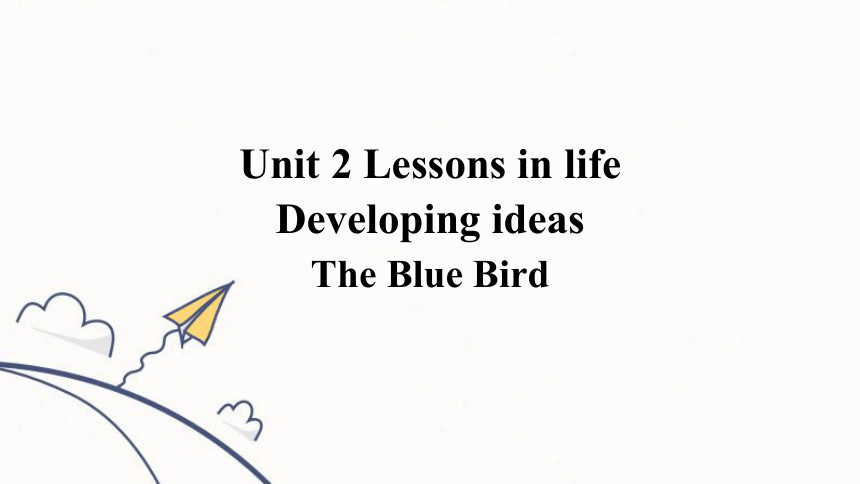 | |
| 格式 | pptx | ||
| 文件大小 | 25.7MB | ||
| 资源类型 | 教案 | ||
| 版本资源 | 外研版(2019) | ||
| 科目 | 英语 | ||
| 更新时间 | 2025-04-23 08:57:53 | ||
图片预览

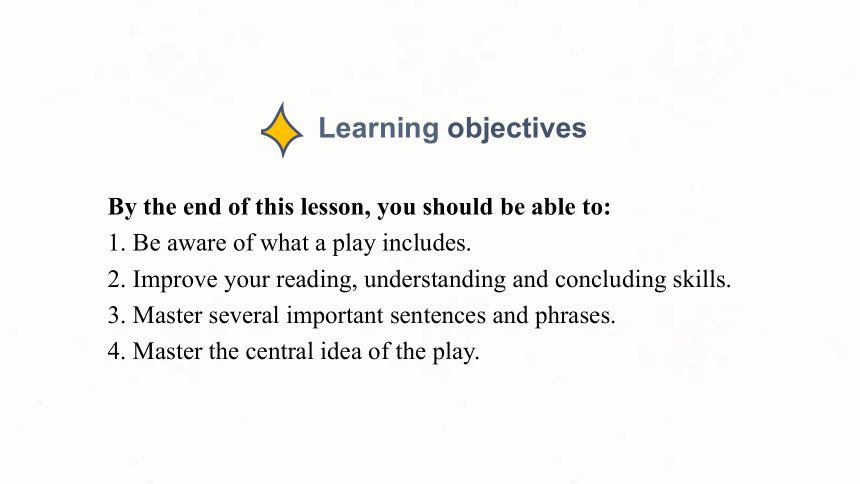
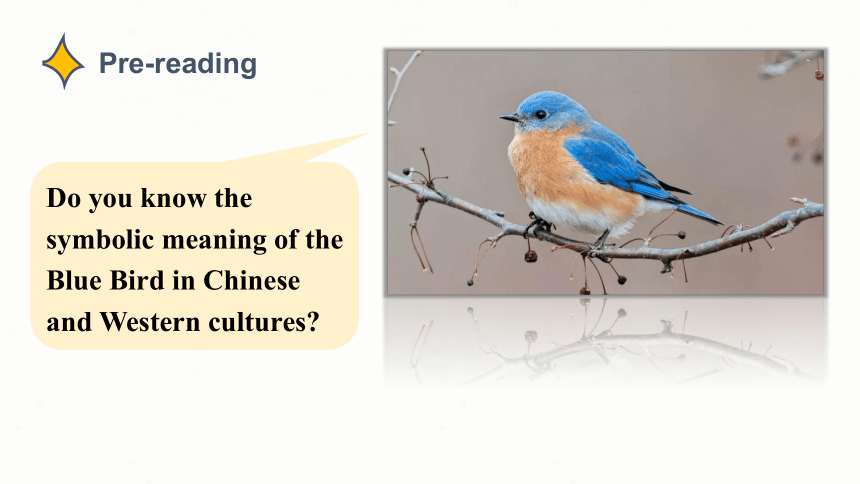


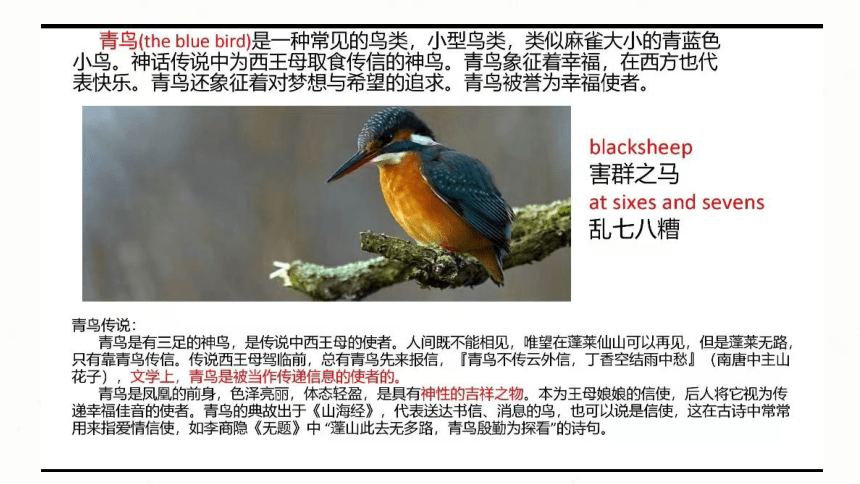
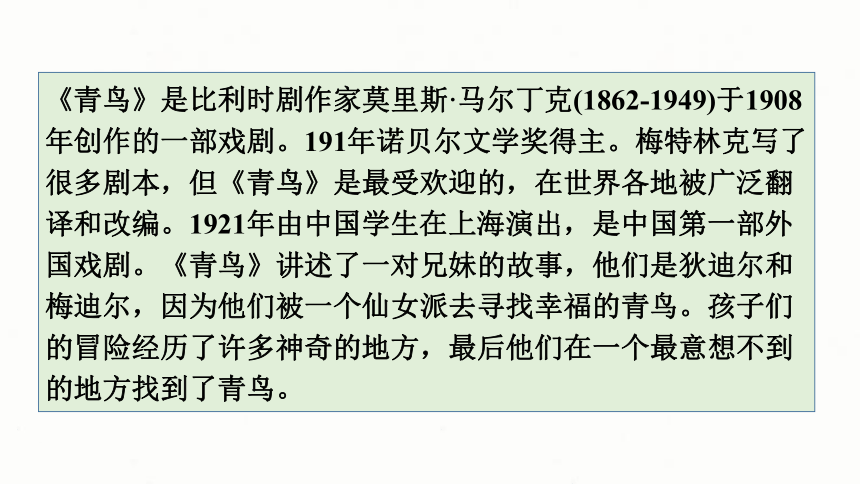
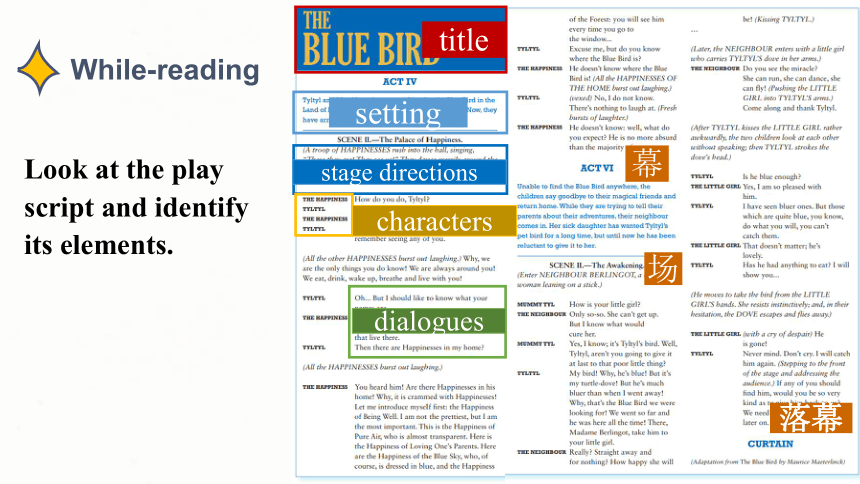

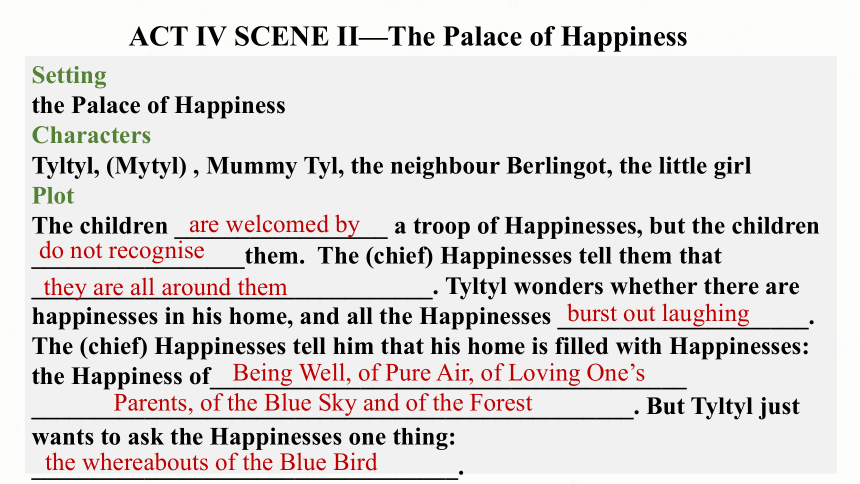
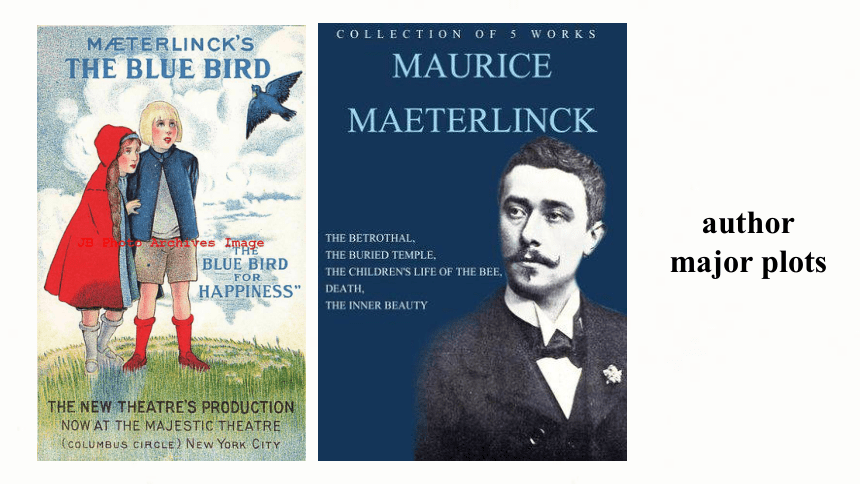
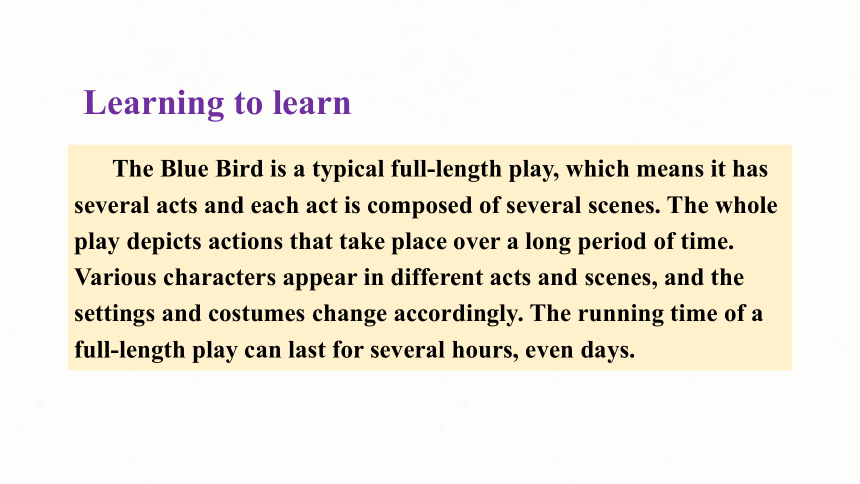
文档简介
(共33张PPT)
The Blue Bird
Unit 2 Lessons in life
Developing ideas
By the end of this lesson, you should be able to:
1. Be aware of what a play includes.
2. Improve your reading, understanding and concluding skills.
3. Master several important sentences and phrases.
4. Master the central idea of the play.
Learning objectives
Do you know the symbolic meaning of the Blue Bird in Chinese and Western cultures
Pre-reading
蓬山此去无多路,青鸟殷勤为探看。—— 【唐】李商隐
十年青鸟音尘断,往事不胜思。——【清】纳兰性德
青鸟不传云外信,丁香空结雨中愁。——【五代】李璟
愿因三青鸟,更报长相思。
——【唐】李白
What’s the symbolic meaning of the Blue Bird in Chinese and Western culture
The Blue Bird is a symbol of _______ .
in Chinese culture
messenger
in Western culture
happiness
v. 上演,举办
Read the introduction to The Blue Bird (《青鸟》) and answer the questions:
1. What is The Blue Bird
2. Who are the main characters
3. What is the main plot
It’s a 1908 Nobel Prize winning play by Belgian play wright Maurice Maeterlinck and the first foreign play staged in China.
Tyltyl and Mytyl, bother and sister.
Tyltyl and Mytyl travel magical places to find the Blue Bird of Happiness.
Pre-reading
The Blue Bird is a 1908 play by Belgian playwright Maurice Maeterlinck (1862-1949). winner of the Nobel Prize in Literature in 1911. Maeterlinck wrote many plays, but The Blue Bird was the most popular and has been widely translated and adapted all over the world. Performed in 1921 in Shanghai by Chinese students, it was the first foreign play staged in China. The Blue Bird tells the tale of brother and sister, Tyltyl and Mytyl, as they are sent by a fairy to search for the Blue Bird of Happiness. The children's adventure takes them through many magical places before they at last find the Blue Bird in a most unexpected place.
《青鸟》是比利时剧作家莫里斯·马尔丁克(1862-1949)于1908年创作的一部戏剧。191年诺贝尔文学奖得主。梅特林克写了很多剧本,但《青鸟》是最受欢迎的,在世界各地被广泛翻译和改编。1921年由中国学生在上海演出,是中国第一部外国戏剧。《青鸟》讲述了一对兄妹的故事,他们是狄迪尔和梅迪尔,因为他们被一个仙女派去寻找幸福的青鸟。孩子们的冒险经历了许多神奇的地方,最后他们在一个最意想不到的地方找到了青鸟。
title
setting
stage directions
characters
dialogues
幕
场
落幕
Look at the play script and identify its elements.
While-reading
Read for details
ACT Ⅳ SCENE Ⅱ
Characters
Setting
Plot
The children come to the Palace of Happiness and are welcomed by a troop of Happiness …
ACT Ⅵ SCENE Ⅱ
Characters
Setting
Plot
The children return home without finding the Blue Bird…
While-reading
Setting
the Palace of Happiness
Characters
Tyltyl, (Mytyl) , Mummy Tyl, the neighbour Berlingot, the little girl
Plot
The children _________________ a troop of Happinesses, but the children _________________them. The (chief) Happinesses tell them that ________________________________. Tyltyl wonders whether there are happinesses in his home, and all the Happinesses ____________________. The (chief) Happinesses tell him that his home is filled with Happinesses: the Happiness of______________________________________
________________________________________________. But Tyltyl just wants to ask the Happinesses one thing: __________________________________.
ACT IV SCENE II—The Palace of Happiness
are welcomed by
do not recognise
they are all around them
burst out laughing
the whereabouts of the Blue Bird
Being Well, of Pure Air, of Loving One’s
Parents, of the Blue Sky and of the Forest
author
major plots
Learning to learn
The Blue Bird is a typical full-length play, which means it has several acts and each act is composed of several scenes. The whole play depicts actions that take place over a long period of time. Various characters appear in different acts and scenes, and the settings and costumes change accordingly. The running time of a full-length play can last for several hours, even days.
ACT IV SCENE II
Characters
Tyltyl, (Mytyl,) a troop of Happinesses,
the (chief) Happiness
Setting
Tyltyl and Mytyl have been searching for the Blue Bird in the Land of Memory, the Palace of Night and the Forest. Now they have arrived at the Palace of Happiness. A troop of Happinesses rush into the hall and speak to them.
Where is the “unexpected place”
Why can’t they notice the bluebird is at home
What are other things they ignore at their home
Read ACT IV and find out :
Blue Sky
Forest
Loving One’s Parents
Pure Air
Being Well
Why can’t Tyltyl recognize these happinesses
More examples
How can we find happiness
happiness
ACT VI SCENE II
Characters
Tyltyl, (Mytyl,) Mummy Tyl, the neighbour Berlingot, the little girl
Setting
Unable to find the Blue Bird anywhere, the children return home. While they are trying to tell their parents about their adventures, their neighbour comes in. She is asking for Tyltyl’s bird for her sick little girl.
Read ACT VI and find out :
What makes Tyltyl and Mytyl happy in this part
Act out to spread happiness
Perform one scene of the play
Recommend the play
Share 3 ways to feel happy
Group work
ACT IV SCENE II — The Palace of Happiness
Tyltyl and Mytyl have been searching for the Blue Bird in the Land of Memory, the Palace of Night and the Forest. Now, they have arrived at the Palace of Happiness.
(A troop of HAPPINESSES rush into the ball, singing, “There they are! They see us!” They dance merrily around the CHILDREN, then the one who appears to be the chief goes up to TYLTYL with hand outstretched.)THE HAPPINESS: How do you do, Tyltyl TYLTYL: Who are you
ACT VI SCENE II — The Awakening
Unable to find the Blue Bird anywhere, the children say goodbye to their magical friends and return home. While they are trying to tell their parents about their adventures, their neighbour comes in. Her sick daughter has wanted Tyltyl’s pet bird for a long time, but until now her has been reluctant to give it to her.
(Enter NEIGHBOUR BERLINGOT, a little old woman leaning on a stick.) MUMMY TYL: How is your little girl THE NEIGHBOUR: Only so-so. She can’t get up. But I know what would cure her.
Why does the Blue Bird fly away in the end
Happiness, just like the Blue Bird, can not stay with us forever. It might disappear if we don’t value it. It may be lost but it can be found again. So we should cherish happiness and keep pursuing happiness.
Language Points
Language Points
Why
Why,no...I don't remember seeing any of you.
Why, we are the only things you do know!
Why, it is crammed with Happinesses!
WHY在这里不表示常见的含义“为什么”,而是表示惊讶或突然意识到某事,意思是“哎呀,嘿”。
Exclamatory Sentence
TYLTYL Then there are Happinesses in my home
THE HAPPINESS You heard him! Are there Happinesses in his home! Why, it is crammed with Happinesses!
以上对白中You heard him!使用过去式是非常贴切的、应景的。作者连用三个感叹句来表达一种强烈的情感,寓意深刻。另外以上对白中出现了陈述句式的疑问句和疑问句式的感叹句,这些在文学作品中,尤其是戏剧中比较常见。
Language Points
1. a troop of
2. rush into someplace
3. go up to sb
4. remember doing
5. burst out laughing
6. should like to do
7. be crammed with sb/sth
8. be dressed in
9. no more...than
10.the majority of...
11. say goodbye to sb
12.be reluctant to do
13. lean on/against sth
14. straight away
e along
16. be pleased with sb
17. in their hesitation
18.later on
1.一群(a group of/ a flock of)
2.冲向某个地方
3. 走向某人
4. 记得做过某事(remember to do记得要做某事)
5. 突然大笑起来=burst into laughter / burst in闯进来 burst into突然破门而入(房间、建筑物等)
6.想要做某事
7.挤满......
8.穿着
9.不比...更...;和...一样不...
10.大多数
11. 向某人道别
12. 不情愿做某事(be unwilling to do)
13. 倚着,靠着...
14.马上,立刻
15. 跟着来(用于祈使句以鼓励某人某事,尤指促其加速、努力或试一试)
16. 对某人很满意
17. 在某人犹豫时
18.后来,以后
Language Points
1. They dance merrily around the CHILDREN, then the one who appears to be the chief goes up to TYLTYL with hand outstretched.
2. There is nothing to laugh at.
3. He is no more absurd than the majority of men.
4. Stepping to the front of the stage and addressing the audience.
5. If any of you should find him, would you be so very kind as to give him back to us
Language Points
1. They dance merrily around the CHILDREN, then the one who appears to be the chief goes up to TYLTYL with hand outstretched.
翻译:他们围绕着孩子们欢快地跳起舞来,然后,一个头领模样的人走向狄蒂尔,对他伸出了手。
回顾:with复合结构/ appear
with+宾语(n/pron)+宾补(v-ing/ed/to; adj.adv.介词短语)
seem /appear + adj / to be It seems / appears that....
2. There is nothing to laugh at.
翻译:这里没什么可笑的。(原文:这有什么好笑的!)
3. He is no more absurd than the majority of men.
翻译:他和大多数人一样都不可笑。
(no more ...than ...不比…一样…;和…一样不…)
【归纳拓展】
more than超过,多余;不仅仅;非常,十分 more...than...与其说,倒不如
no more than只是,仅仅 less than少于
Their replies were no more than grunts of acknowledgement.
他们的回答不过是表示感谢的咕哝声。
Language Points
4. Stepping to the front of the stage and addressing the audience.
翻译:走到舞台前面并向观众致辞。
语境猜词:词性+词义
1. The professor gave an address to the college students.
2. The related departments are concerned about the issue and have taken many measures to address it.
3. I haven't received the letter he addressed to me last week yet.
4. He addressed an audience of 10,000 supporters.
①n.住址,地址;演说,演讲deliver an address
②v.设法解决,处理 address (oneself to)sth
③v.致函,写(收信人)姓名、地址 (address... to...将...寄给...)
④v.演说,演讲 (address sb)
称呼(某人)(address sb as) ;
Language Points
5. If any of you should find him, would you be so very kind as to give him back to us
翻译:你们若是有谁找到了它,能请你们把它归还给我们吗?
翻译:她非常聪明,能解决这个问题。
She is so wise as to solve the problem.
总结虚拟语气用法:
1. If I should solve the problem, I would adopt a different approach.
2. If the weather were fine now, we would have a picnic.
3. If he hadn't taken immediate action, the situation would have been worse.
Language Points
虚拟语气的倒装:
1. If I should solve the problem, I would adopt a different approach.
2. If the weather were fine now, we would have a picnic.
3. If he hadn't taken immediate action, the situation would have been worse.
【If 省略,将be/ 助动词 放句首】
Should I solve the problem, I would adopt a different approach.
Were the weather fine now, we would have a picnic.
Had he taken immediate action, the situation would have been worse.
一词多义:strike-- struck struck(stricken)
撞击;打;击打,踢(球等); 突击,攻击;(疾病)侵袭;爆发
突然想到;一下子想起;猛地意识到(sth struck/occurred to/hit sb = It occurred to / struck /hit sb that)
给(某人以…)印象;让(某人)觉得
罢工;擦,划(火柴);击出(火星); 敲,鸣,报时
He fell, striking his head on the edge of the table. 他摔倒了,头碰在桌棱上。
She struck him in the face. 她掴了他一耳光。
He walked up to the penalty spot and struck the ball firmly into the back of the net.
他走到罚球点,稳稳地把球踢入网内。
The lion crouched(蜷伏,蹲伏) ready to strike. 狮子蹲身准备袭击。
The area was struck by an outbreak of cholera. 那一地区爆发了霍乱。
An awful thought has just struck me. 刚才我脑子里突然闪过一个可怕的念头。
She strikes me as a very efficient person. 在我眼里,她是个很干练的人。
The union has voted to strike for a pay increase of 6%.
工会投票决定罢工,要求加薪6%。
The matches were damp and he couldn't make them strike. 火柴受潮了,他划不着。
The clock has just struck three. 时钟刚刚敲过三点。
Strike while the iron is hot. 趁热打铁
Your article about living in a global village really struck a chord with me because I've just returned from a teaching project in Cambodia and Thailand.你关于生活在地球村的文章真的触动了我的心弦,因为我刚从柬埔寨和泰国的一个教学项目回来。
address
n. 住址;地址; 演讲,演说
v. 写(收信人)姓名地址;致函; 演说;演讲 (to address a meeting 在会议上发表演讲)
向…说话(address sb /address sth to sb)
称呼(某人);冠以(某种称呼)(address sb as)
设法解决;处理;对付
The letter was correctly addressed, but delivered to the wrong house. 信上的姓名地址写得都对,但被错投到另一家去了。
address = give a speech = deliver a speech
Boston Globe reporter Chris Reidy notes that the situation will improve only when there are comprehensive programs that address the many needs of the homeless.[2006年完形]
《波士顿环球日报》记者克里斯"雷迪认为只有通过多方面规划来解决这些无家可归者的各种需求,这种局面才有可能得到改善。
Read ACT II SCENE II—The Land of Memory
Write a review no less than 80 words.
Assignment
The Blue Bird
Unit 2 Lessons in life
Developing ideas
By the end of this lesson, you should be able to:
1. Be aware of what a play includes.
2. Improve your reading, understanding and concluding skills.
3. Master several important sentences and phrases.
4. Master the central idea of the play.
Learning objectives
Do you know the symbolic meaning of the Blue Bird in Chinese and Western cultures
Pre-reading
蓬山此去无多路,青鸟殷勤为探看。—— 【唐】李商隐
十年青鸟音尘断,往事不胜思。——【清】纳兰性德
青鸟不传云外信,丁香空结雨中愁。——【五代】李璟
愿因三青鸟,更报长相思。
——【唐】李白
What’s the symbolic meaning of the Blue Bird in Chinese and Western culture
The Blue Bird is a symbol of _______ .
in Chinese culture
messenger
in Western culture
happiness
v. 上演,举办
Read the introduction to The Blue Bird (《青鸟》) and answer the questions:
1. What is The Blue Bird
2. Who are the main characters
3. What is the main plot
It’s a 1908 Nobel Prize winning play by Belgian play wright Maurice Maeterlinck and the first foreign play staged in China.
Tyltyl and Mytyl, bother and sister.
Tyltyl and Mytyl travel magical places to find the Blue Bird of Happiness.
Pre-reading
The Blue Bird is a 1908 play by Belgian playwright Maurice Maeterlinck (1862-1949). winner of the Nobel Prize in Literature in 1911. Maeterlinck wrote many plays, but The Blue Bird was the most popular and has been widely translated and adapted all over the world. Performed in 1921 in Shanghai by Chinese students, it was the first foreign play staged in China. The Blue Bird tells the tale of brother and sister, Tyltyl and Mytyl, as they are sent by a fairy to search for the Blue Bird of Happiness. The children's adventure takes them through many magical places before they at last find the Blue Bird in a most unexpected place.
《青鸟》是比利时剧作家莫里斯·马尔丁克(1862-1949)于1908年创作的一部戏剧。191年诺贝尔文学奖得主。梅特林克写了很多剧本,但《青鸟》是最受欢迎的,在世界各地被广泛翻译和改编。1921年由中国学生在上海演出,是中国第一部外国戏剧。《青鸟》讲述了一对兄妹的故事,他们是狄迪尔和梅迪尔,因为他们被一个仙女派去寻找幸福的青鸟。孩子们的冒险经历了许多神奇的地方,最后他们在一个最意想不到的地方找到了青鸟。
title
setting
stage directions
characters
dialogues
幕
场
落幕
Look at the play script and identify its elements.
While-reading
Read for details
ACT Ⅳ SCENE Ⅱ
Characters
Setting
Plot
The children come to the Palace of Happiness and are welcomed by a troop of Happiness …
ACT Ⅵ SCENE Ⅱ
Characters
Setting
Plot
The children return home without finding the Blue Bird…
While-reading
Setting
the Palace of Happiness
Characters
Tyltyl, (Mytyl) , Mummy Tyl, the neighbour Berlingot, the little girl
Plot
The children _________________ a troop of Happinesses, but the children _________________them. The (chief) Happinesses tell them that ________________________________. Tyltyl wonders whether there are happinesses in his home, and all the Happinesses ____________________. The (chief) Happinesses tell him that his home is filled with Happinesses: the Happiness of______________________________________
________________________________________________. But Tyltyl just wants to ask the Happinesses one thing: __________________________________.
ACT IV SCENE II—The Palace of Happiness
are welcomed by
do not recognise
they are all around them
burst out laughing
the whereabouts of the Blue Bird
Being Well, of Pure Air, of Loving One’s
Parents, of the Blue Sky and of the Forest
author
major plots
Learning to learn
The Blue Bird is a typical full-length play, which means it has several acts and each act is composed of several scenes. The whole play depicts actions that take place over a long period of time. Various characters appear in different acts and scenes, and the settings and costumes change accordingly. The running time of a full-length play can last for several hours, even days.
ACT IV SCENE II
Characters
Tyltyl, (Mytyl,) a troop of Happinesses,
the (chief) Happiness
Setting
Tyltyl and Mytyl have been searching for the Blue Bird in the Land of Memory, the Palace of Night and the Forest. Now they have arrived at the Palace of Happiness. A troop of Happinesses rush into the hall and speak to them.
Where is the “unexpected place”
Why can’t they notice the bluebird is at home
What are other things they ignore at their home
Read ACT IV and find out :
Blue Sky
Forest
Loving One’s Parents
Pure Air
Being Well
Why can’t Tyltyl recognize these happinesses
More examples
How can we find happiness
happiness
ACT VI SCENE II
Characters
Tyltyl, (Mytyl,) Mummy Tyl, the neighbour Berlingot, the little girl
Setting
Unable to find the Blue Bird anywhere, the children return home. While they are trying to tell their parents about their adventures, their neighbour comes in. She is asking for Tyltyl’s bird for her sick little girl.
Read ACT VI and find out :
What makes Tyltyl and Mytyl happy in this part
Act out to spread happiness
Perform one scene of the play
Recommend the play
Share 3 ways to feel happy
Group work
ACT IV SCENE II — The Palace of Happiness
Tyltyl and Mytyl have been searching for the Blue Bird in the Land of Memory, the Palace of Night and the Forest. Now, they have arrived at the Palace of Happiness.
(A troop of HAPPINESSES rush into the ball, singing, “There they are! They see us!” They dance merrily around the CHILDREN, then the one who appears to be the chief goes up to TYLTYL with hand outstretched.)THE HAPPINESS: How do you do, Tyltyl TYLTYL: Who are you
ACT VI SCENE II — The Awakening
Unable to find the Blue Bird anywhere, the children say goodbye to their magical friends and return home. While they are trying to tell their parents about their adventures, their neighbour comes in. Her sick daughter has wanted Tyltyl’s pet bird for a long time, but until now her has been reluctant to give it to her.
(Enter NEIGHBOUR BERLINGOT, a little old woman leaning on a stick.) MUMMY TYL: How is your little girl THE NEIGHBOUR: Only so-so. She can’t get up. But I know what would cure her.
Why does the Blue Bird fly away in the end
Happiness, just like the Blue Bird, can not stay with us forever. It might disappear if we don’t value it. It may be lost but it can be found again. So we should cherish happiness and keep pursuing happiness.
Language Points
Language Points
Why
Why,no...I don't remember seeing any of you.
Why, we are the only things you do know!
Why, it is crammed with Happinesses!
WHY在这里不表示常见的含义“为什么”,而是表示惊讶或突然意识到某事,意思是“哎呀,嘿”。
Exclamatory Sentence
TYLTYL Then there are Happinesses in my home
THE HAPPINESS You heard him! Are there Happinesses in his home! Why, it is crammed with Happinesses!
以上对白中You heard him!使用过去式是非常贴切的、应景的。作者连用三个感叹句来表达一种强烈的情感,寓意深刻。另外以上对白中出现了陈述句式的疑问句和疑问句式的感叹句,这些在文学作品中,尤其是戏剧中比较常见。
Language Points
1. a troop of
2. rush into someplace
3. go up to sb
4. remember doing
5. burst out laughing
6. should like to do
7. be crammed with sb/sth
8. be dressed in
9. no more...than
10.the majority of...
11. say goodbye to sb
12.be reluctant to do
13. lean on/against sth
14. straight away
e along
16. be pleased with sb
17. in their hesitation
18.later on
1.一群(a group of/ a flock of)
2.冲向某个地方
3. 走向某人
4. 记得做过某事(remember to do记得要做某事)
5. 突然大笑起来=burst into laughter / burst in闯进来 burst into突然破门而入(房间、建筑物等)
6.想要做某事
7.挤满......
8.穿着
9.不比...更...;和...一样不...
10.大多数
11. 向某人道别
12. 不情愿做某事(be unwilling to do)
13. 倚着,靠着...
14.马上,立刻
15. 跟着来(用于祈使句以鼓励某人某事,尤指促其加速、努力或试一试)
16. 对某人很满意
17. 在某人犹豫时
18.后来,以后
Language Points
1. They dance merrily around the CHILDREN, then the one who appears to be the chief goes up to TYLTYL with hand outstretched.
2. There is nothing to laugh at.
3. He is no more absurd than the majority of men.
4. Stepping to the front of the stage and addressing the audience.
5. If any of you should find him, would you be so very kind as to give him back to us
Language Points
1. They dance merrily around the CHILDREN, then the one who appears to be the chief goes up to TYLTYL with hand outstretched.
翻译:他们围绕着孩子们欢快地跳起舞来,然后,一个头领模样的人走向狄蒂尔,对他伸出了手。
回顾:with复合结构/ appear
with+宾语(n/pron)+宾补(v-ing/ed/to; adj.adv.介词短语)
seem /appear + adj / to be It seems / appears that....
2. There is nothing to laugh at.
翻译:这里没什么可笑的。(原文:这有什么好笑的!)
3. He is no more absurd than the majority of men.
翻译:他和大多数人一样都不可笑。
(no more ...than ...不比…一样…;和…一样不…)
【归纳拓展】
more than超过,多余;不仅仅;非常,十分 more...than...与其说,倒不如
no more than只是,仅仅 less than少于
Their replies were no more than grunts of acknowledgement.
他们的回答不过是表示感谢的咕哝声。
Language Points
4. Stepping to the front of the stage and addressing the audience.
翻译:走到舞台前面并向观众致辞。
语境猜词:词性+词义
1. The professor gave an address to the college students.
2. The related departments are concerned about the issue and have taken many measures to address it.
3. I haven't received the letter he addressed to me last week yet.
4. He addressed an audience of 10,000 supporters.
①n.住址,地址;演说,演讲deliver an address
②v.设法解决,处理 address (oneself to)sth
③v.致函,写(收信人)姓名、地址 (address... to...将...寄给...)
④v.演说,演讲 (address sb)
称呼(某人)(address sb as) ;
Language Points
5. If any of you should find him, would you be so very kind as to give him back to us
翻译:你们若是有谁找到了它,能请你们把它归还给我们吗?
翻译:她非常聪明,能解决这个问题。
She is so wise as to solve the problem.
总结虚拟语气用法:
1. If I should solve the problem, I would adopt a different approach.
2. If the weather were fine now, we would have a picnic.
3. If he hadn't taken immediate action, the situation would have been worse.
Language Points
虚拟语气的倒装:
1. If I should solve the problem, I would adopt a different approach.
2. If the weather were fine now, we would have a picnic.
3. If he hadn't taken immediate action, the situation would have been worse.
【If 省略,将be/ 助动词 放句首】
Should I solve the problem, I would adopt a different approach.
Were the weather fine now, we would have a picnic.
Had he taken immediate action, the situation would have been worse.
一词多义:strike-- struck struck(stricken)
撞击;打;击打,踢(球等); 突击,攻击;(疾病)侵袭;爆发
突然想到;一下子想起;猛地意识到(sth struck/occurred to/hit sb = It occurred to / struck /hit sb that)
给(某人以…)印象;让(某人)觉得
罢工;擦,划(火柴);击出(火星); 敲,鸣,报时
He fell, striking his head on the edge of the table. 他摔倒了,头碰在桌棱上。
She struck him in the face. 她掴了他一耳光。
He walked up to the penalty spot and struck the ball firmly into the back of the net.
他走到罚球点,稳稳地把球踢入网内。
The lion crouched(蜷伏,蹲伏) ready to strike. 狮子蹲身准备袭击。
The area was struck by an outbreak of cholera. 那一地区爆发了霍乱。
An awful thought has just struck me. 刚才我脑子里突然闪过一个可怕的念头。
She strikes me as a very efficient person. 在我眼里,她是个很干练的人。
The union has voted to strike for a pay increase of 6%.
工会投票决定罢工,要求加薪6%。
The matches were damp and he couldn't make them strike. 火柴受潮了,他划不着。
The clock has just struck three. 时钟刚刚敲过三点。
Strike while the iron is hot. 趁热打铁
Your article about living in a global village really struck a chord with me because I've just returned from a teaching project in Cambodia and Thailand.你关于生活在地球村的文章真的触动了我的心弦,因为我刚从柬埔寨和泰国的一个教学项目回来。
address
n. 住址;地址; 演讲,演说
v. 写(收信人)姓名地址;致函; 演说;演讲 (to address a meeting 在会议上发表演讲)
向…说话(address sb /address sth to sb)
称呼(某人);冠以(某种称呼)(address sb as)
设法解决;处理;对付
The letter was correctly addressed, but delivered to the wrong house. 信上的姓名地址写得都对,但被错投到另一家去了。
address = give a speech = deliver a speech
Boston Globe reporter Chris Reidy notes that the situation will improve only when there are comprehensive programs that address the many needs of the homeless.[2006年完形]
《波士顿环球日报》记者克里斯"雷迪认为只有通过多方面规划来解决这些无家可归者的各种需求,这种局面才有可能得到改善。
Read ACT II SCENE II—The Land of Memory
Write a review no less than 80 words.
Assignment
